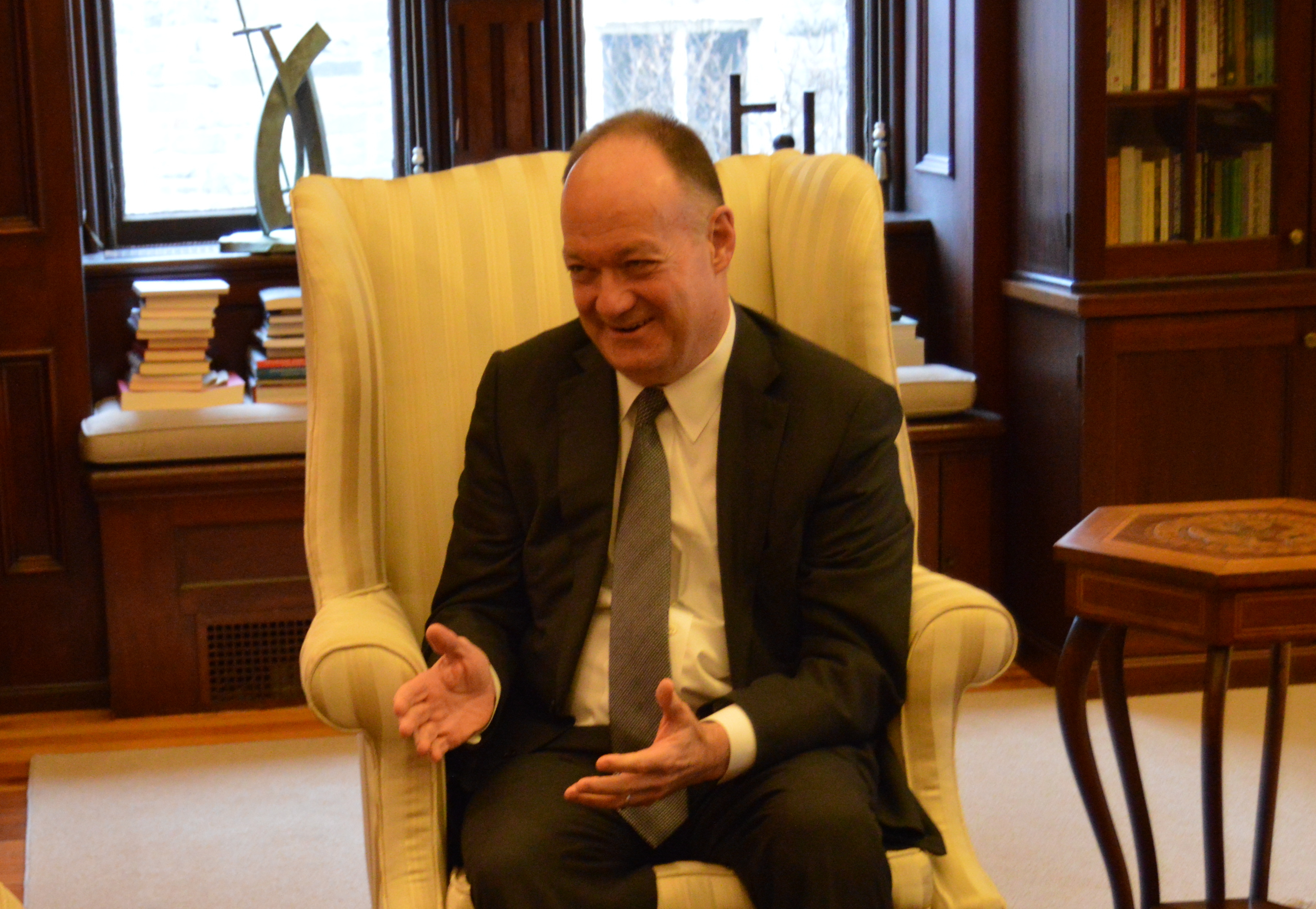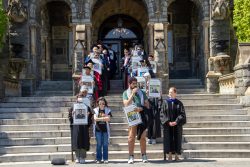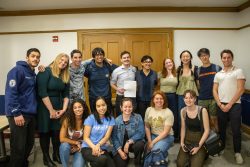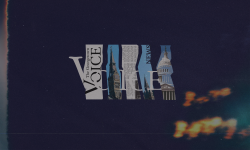On March 20, Editor-in-Chief Alex Boyd sat down with President John DeGioia to discuss the issues of graduate student unionization, affordability, reconciliation with descendents of the 272, activism, gender equity, and the impact of Georgetown’s Catholic identity on student life. This interview has been edited for clarity and length.
Graduate Student Unionization
Alex Boyd: What went into the decision to consider entering into a private election with a third party arbitrator, and for the university, why is that preferable to an election with the [National Labor Relations Board]?
President DeGioia: So let me just clarify a couple of points. First, GAGE [Georgetown Association of Graduate Employees] first presented to us a request that we recognise them without an election. And that’s what we said “no” to. We didn’t say “no” to anything else, just no to try to be established as a formal union without an election. When we did that—this perhaps caused some controversy—when we did that we explained our sense about the nature of the primary relationship of a graduate student to the university which we think of in academic terms. We don’t think of it as primarily as…We think of it as faculty-student more than we do employer-employee. But to be clear, all we said no to was we would not recognize you without an election.
When we did that, then GAGE and [the American Federation of Teachers, GAGE’s union affiliate] came back to us and suggested how about if we do this as a private election with a third party, the American Arbitration Association, as our partner in this. We accepted that and now we’ve spent the last several weeks engaged in just that process. And it’s been going very well. We’re hopeful that we will be able to come up with an approach that accomplishes both our needs and their needs. So from our perspective, what we’re concerned about, is that there are academic conditions that need to guide the relationship of a faculty member and the graduate student. From the graduate student perspective, there’s a dimension of their life where they’re working. So, what we want to do is protect that which is academic. What they would like is to protect what is essentially employment. And we think there’s a way through this where we can accomplish our goals and they can accomplish their goals. And we’re hopeful we’ll be able to get there.
Affordability
Boyd: Tuition rose again going into next year, but at a lower rate than anticipated. So, are tuition rises inevitable and is it something students should expect going into each year?
DeGioia: Well, what we hope we can do is give you a sense of what we are imagining or projecting. In order for us to meet our expense base we need to ensure sufficient revenue and about 70 percent of our revenue comes from tuition. So we know as our expenses grow, generally we have two fundamental expenses. Salaries — our workforce, faculty, staff. And then financial aid. Now the costs for financial aid don’t necessarily rise as fast if we keep our tuition down, but generally wages do increase. So we’re always trying to manage our cost in the most careful way possible.
We’ve been able to keep those increases at the lowest rates they’ve been in now almost 50 years. The year over year increases have been very modest. Our provost, Bob Groves, has tried to be very transparent about why the increases, what they’re going to fund, what drives them. And I think we’ll continue to do that at the kind of roundtables that he’s been doing over the course of this year.
We recognize that it’s a burden for everyone. We also try to mitigate that by sustaining our commitment to need-blind, full-meet financial aid. This is our 40th year of need-blind, full-meet, and it is an element of how we sustain affordability. And this year I think we’re projecting overall our financial aid budget will be above $200 million. So as I said the two biggest drivers for cost for us are wages and financial aid.
The other thing I’d say though, Alex, before we finish this conversation you might have an idea of how we could become that much better as a university, and generally it means more cost.
We’ve been successful in our two most successful fundraising campaigns. We’ve raised more than $2 billion since 2001. Our endowment has increased almost, at least close to three to four times over that period. All of that contributes, so it is a whole community engagement around philanthropy. I mean, our biggest sources of support, there really are three. There’s tuition. There’s sponsored research. And there’s philanthropy. Sponsored research really impacts the medical center more than it does anywhere else but philanthropy has its biggest impact on the main campus. And so we’re preparing now the groundwork for our next major fundraising drive and again, in the last campaign financial aid was our first priority and we raised more money in the campaign than we had in the prior 215 years of the university. It’s been a very generous community from our whole, you know the entire network of families, and alumni and parents. It’s on us to make sure that we’re doing everything we can to manage cost growth.
Boyd: Now when there are pushes to improve the school and, like you said, it all costs money, how do you balance affordability and accessibility with the logistical challenges of improving the school?
DeGioia: Yeah, that’s what the challenge of doing this work entails. On the one hand, we got to ensure we can sustain accessibility and affordability and at the same time, there are just expectations that our students and faculty have for how we can be that much better as a university. And how we balance those two dynamics is what makes this job so incredibly challenging and interesting.
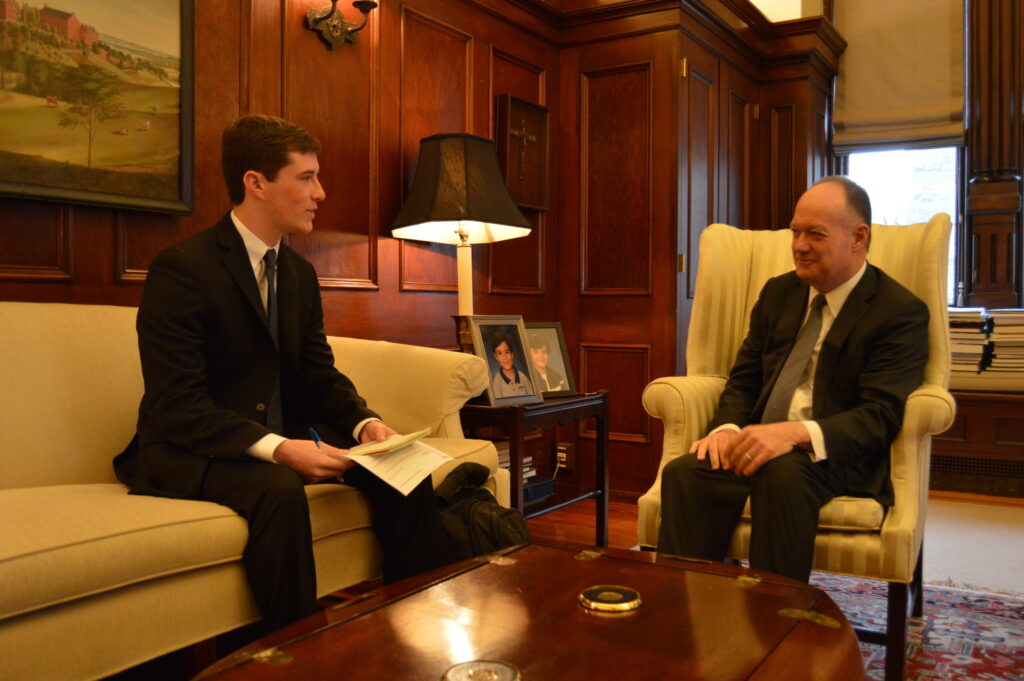

Descendants of the 272
Boyd: How has the university been moving forward with outreach efforts for the descendants and their advocacy organizations?
DeGioia: Sure. So you know I think in the spring of 2016, I’ve reported this on other occasions, when it became clear that members of the descendant community had an interest in connecting with Georgetown, we embraced that opportunity. I went first to Spokane to meet with one leader, and then I went to Louisiana. I’ve met with leadership, with families in New Orleans, in Maringouin, and in Baton Rouge, [Louisiana]. Probably in that roughly two to three week period in June of 2016, I probably met with about 60 to 75 members of the descendant community. And we invited them in to engage us in this work. Over the years, many folks have visited the archives, some have had their family reunions here, but probably the most significant engagement was when we had our liturgy of reconciliation, memory and hope last April and we invited members of the descendant community to be here. And when we came into Gaston Hall more than 100 members marched in to the liturgy and we had a couple of members of the descendant community speak as part of the program at the liturgy, and when we dedicated the building we had many and I had a meeting here with all the descendants who came were here for that day.
And over the course of now the last 11 months we’ve sustained those conversations. There are a number of different cohorts of descendants. Our goal right now is to try to create a framework where we can engage with all of them. In January, I presented a series of principles that we hope will be able to guide conversation as we go forward. Over the course of last year we had a number of our colleagues go down to Louisiana and meet with folks and leadership or the Jesuit order has gone down to Louisiana. We’ve tried to do this in a balanced way where we and the Jesuits recognize our different responsibilities, but the principles that I articulated are really designed to create a framework that would enable all the descendents to engage with us in an ongoing effort.
Boyd: Right. So obviously the GU272 Isaac Hawkins Legacy Group renewed calls for monetary reparations. Is that something that’s feasible?
DeGioia: You know, I think what we want to be able to do is get into the conversation with folks. Different groups have argued for different kinds of responses from the university. What I’ve made clear to date is that the response from the university needed to be authentically a university response. So part of what we’ve tried to do is position the university to make an ever deeper commitment and contribution to have a bigger impact in addressing racial injustice.
We’ve had a series of proposals but we’ve moved forward and we’re moving forward on some. We’ve created the department of African American Studies, we’ve recruited some new faculty to the department. One recommendation from the Working Group on Slavery, Memory and Reconciliation was to establish something like an institute or center on the study of slavery and its legacies. We’ve moving that conversation forward.
I proposed, independent of this work on slavery, memory and reconciliation, I proposed in February of 2016, before the committee finished its work, given what was taking place in our nation at the time that there was a deeper commitment for us in addressing racial justice. There was a Georgetown response. I think you’ve seen some of that work unfold. The work in health disparities that Christopher King has led, the commission on African American affairs for the District of Columbia that professor Maurice Jackson has led. We have work that Marc Howard is leading on prison, on criminal justice reform, with colleagues from our law center. A good deal of work on health disparities by many members of the community. We created the Health Justice Alliance between the medical center and the law school. These are all initiatives in this context of ‘How does the university authentically respond to the enduring legacy of slavery and segregation in our country, the persistence of racial injustice?’
Boyd: So what are the challenges and rewards in trying to right the university’s past wrongs?
DeGioia: I think unless you’re living your truth, I don’t think you’re fully capable of achieving your full promise and full potential because there’s something that you’re not acknowledging or recognizing. I think our efforts to address racial justice have been informed by our awareness. The challenge we face as a nation today is inextricably linked with the failure of our nation to ameliorate the initial evil of slavery and subsequent segregation in our country. So if you look at the disparities on every measure that you could look at, from education to health to wealth and housing, in every context the disparities are unacceptable, and really I think can only be explained by this enduring legacy. We never ameliorated the original evil. So unless we come to terms with that, one way we come to terms with that is to understand the degree of complicity we all have in that original evil. And that I think is part of what you see taking place in our nation. There are now more, I think we have more than 30, it could be close to more than nearly 40 members of the organization called the Universities Studying Slavery, and what I think you’re seeing is a recognition that we all need to fully grasp the meaning of our histories. And that’s what we’re trying to do here.
Activism
Boyd: Moving on to activism in a larger sense, the admissions office reassured applicants that there would be no repercussions for engaging in things like the walkout, we had our own walkout, you were speaking. From the university perspective, how do you balance acknowledging the right to student protest with the logistics of running the school from a day-to-day standpoint?
DeGioia: These are great questions. Fundamentally, our students who engage in protest, we have a framework here at Georgetown, our policy on speech and expression, that provides the basic framework for that. And working within that framework, from time to time there is the opportunity where I am invited. So the students invited me to speak and I was honored to be invited. I endorse a position of we need to be much stronger advocates for gun safety and to address the scourge of school violence. We had an incident just an hour ago from here right now taking place in St. Mary’s County.
It’s a high school that is currently on lockdown. I don’t know any of the facts yet. I only know it because I got it right before I came in. I saw it and I said ‘Oh my gosh.’ Just monitoring it now, we don’t know anything yet. I’m not sure if they have the TV on in the other room. But my point is, I was invited to be a part of it, I was honored to be a part of it. There are moments where I feel that, in my role, what I’m often trying to determine is, because we probably have had more of my personal engagement in the last two years than in many years.
Boyd: Yeah, I think of the op-ed in The Hill.
DeGioia: We can take three issues: DACA [Delayed Action for Childhood Arrivals], the travel ban, and the tax bill. And then we can talk about gun safety. In each one of these, what I’m looking at is ‘what does the community expect of me?’ and ‘is there an appropriate role, authentically appropriate role for a university president to weigh in on that matter?’ Because there are lots of folks here who would say… my judgment is that I need to be very prudential of when, where, and how I do it. Because I don’t want to create an atmosphere here where others don’t feel comfortable talking about something. I wouldn’t want people to feel in any way inhibited if they don’t agree with me. So finding that right balance is what I strive for.
So with DACA, we’ve been working on this for my entire years in this job. We go back to working with Senator Durbin in 2001 and he’s a double alum of ours and somebody who we have worked hand-in-hand with over the last 15 years in trying to secure a pathway for our Dreamers. So when that pathway became DACA… if we go back, remember we’ve always treated our Dreamers as if they were absolutely full members of our community. So we treat them just as if they have access to the same benefits and the same financial aid program. We don’t know when we’re admitting them because they don’t have to reveal themselves. And we probably have always had 45 to 60 Dreamers here. But when it became clear that this pathway might be ended and formally was in September we really felt we had a responsibility to our students to step in and play a role here. Partly, I think, because we’re in Washington, my ability to be engaged might be a little bit more than some of my peers.
So then we’ll move to the travel ban. The travel ban is also referred to as a Muslim ban. And in our case, we estimated somewhere between 60 and 100 members of our community would be impacted by it. But we have been an embodiment since our founding of a commitment to pluralism and our religious faiths. And our commitment to interreligious understanding is about as deep a commitment as we could have. And to see that challenged in a significant way… again what does the community expect of me, and is there an appropriate effective role for me to play? And I think standing against the travel ban was the right way to go. And again, probably in this case signing on to the amicus brief which we did the same in DACA.
The third one, the tax bill, that was going to crush our graduate students. We wanted to get in on that one. I didn’t think there was any contest on that one. I think everybody here felt that that was an appropriate way for me to engage because it was going to have such a significant impact on our graduate students. Unfortunately, we’re not wealthy enough that the excise tax on endowment is going to hurt us.
Campus Life
Boyd: Last month you announced the formation of a taskforce for gender equality–
DeGioia: Equity. Gender equity.
Boyd: And how has that progressed over its first month?
DeGioia: We’re in the process of forming it. I just announced it and I indicated that I asked Jane Aiken who is the vice dean of the law center to serve as the chair, and she will. And she and I now are in the process of working with our faculty colleagues and putting together the strongest committee we can. What I’ve indicated is that I’m going to ask them to look at four questions from the perspective of our faculty and staff. First is to look at best practices across higher education. Second is to assess what we’re doing here with that background in mind. Are we doing as well as we can relative to the best work that’s being done? Third is to develop an action plan and to close that gap. And fourth would be to develop a framework for accountability as we go forward.
This builds on some great work of our Women’s Center, of our Women’s Alliance, our Institute for Women, Peace and Security. Our university, because I’m in the role I’m one, but we’re one of 10 universities globally that are, 10 of 30 HeForShe institutions, 10 heads of state, 10 CEOs of corporations and 10 university heads. So I’m one of the ambassadors for that and I’m honored to be able to do it. But our commitment to gender equity is really to ensure that this is the place where all of our faculty and staff can flourish.
Student Life
Boyd: To skip ahead again, this year has presented challenges when it comes to balancing our Catholic identity with pushes in student life and various student organizations. So the example I go to is Love Saxa and how, of course the organizers there are practicing traditional Catholic social teaching whereas other students are concerned with issues like LGBTQ rights. So how does the university reconcile, again, those two pulls?
DeGioia: Again, we try to find that balance. In this case, the folks in Student Activities recognise that this was a group that would have access to benefits. That was challenged and the way we felt it was appropriate was to turn it to the organization that approved it to see whether or not there was a violation of the framework that they originally approved. In the end, they determined there wasn’t. And so it continues. I don’t think it in any way has compromised our commitment to our LGBT students. And I think this is a way in which we are also…we enable our Catholic identity to be manifested in an appropriate way.
There were a couple of mistakes that unfolded, you might have followed when it reached the national news, that we received some funds for the organization and the folks in gift accounting didn’t recognize the group and mistagged it but we got that fixed. They have all the money that was earmarked for them from philanthropy. That was unintentional.
Wrapping Up
Boyd: Last year we asked you if you have a book you could recommend to every Georgetown student and what would it be. So I follow up this year: do you have a song or a band or an album that you would recommend?
DeGioia: Yes, yes, yes, yes. I just saw Springsteen on Broadway. So here’s the backstory. “Born to Run” was released the week I arrived at Georgetown, 1975, my freshman year. The week I arrived. The first month, Springsteen is on the cover of Time and Newsweek and then he came and gave two concerts in December and then three the following October. He was on campus five times in the first three semesters that I was here. So a formative influence. So “Thunder Road,” “Born to Run,” Bruce Springsteen and the E Street Band. That would be what I would recommend.


